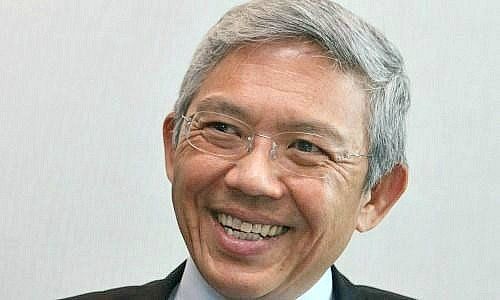BoS CEO Bahren Shaari: «Let's Fall in Love With the Problem»
Bank of Singapore CEO Bahren Shaari tells finews.asia in an interview why amidst all the changes in the industry, some things remain constant – and why independent asset managers tend to be trickier clients to please.
Less than halfway into it, 2019 is already promising to be a good year for Bank of Singapore (BoS), with record first-quarter results and expansion into Luxembourg and London with dedicated new offices.
«We have a lot of clients within the EEA [European Economic Area] so we needed a Luxembourg office to service these clients, many of who are family offices or external asset managers,» says Bahren Shaari, the CEO of BoS who is «never without a suit or a smile» according to one person that used to work with him.
Solutions Going to Be Different
«But the solutions we provide are not going to be different – we are still Asia-focussed and clients come to us for our understanding of China and how to build exposure to China,» he says in an interview with finews.asia.
Shaari may have raised the hundred billion dollar question – how do clients build exposure to China? Banks have been vague at best about specific strategies.
Exposure in China
«Essentially, in four different ways,» he explains. «We work with asset managers like Blackrock and UBS Asset Management who have exposure in China. We work with the large listed companies, including tech giants like Tencent and Alibaba.»
«We offer targeted investment opportunities, as we did with an established real estate developer last year, for example, raising funds for commercial property development in China. We also facilitate direct investments for clients who are looking at pre-IPO funding,» Shaari adds.
Overtaking Real Assets
Direct investments or private markets are jostling public markets out of favored position with the world’s elite if the profusion of «deal clubs» in Asia and the listless offerings for even heavyweights like Uber are any indicator. But Shaari prefers a more considered approach: «Valuations are too high in private markets,» he cautions.
«Asian family offices and independent asset managers,» are where he is focussing instead. «Financial assets are overtaking real assets in the net worth of families,» he explains, and BoS is eager to share the ride with clients ranging from «one man operations» to «more sophisticated set-ups».
Seasoned Ex-Bankers
Direct investments are of course an area of considerable interest for these clients, but so are access to hedge funds and private equity as well as a risk overlay on the portfolio.
Independent asset managers tend to be trickier clients to please, because they are «seasoned ex-bankers who know what they want for their clients,» he says, but Shaari hits the nail on its head when he says «an independent asset manager’s main assets are their clients, they do not want to invest in creating infrastructure.»
Moreover, this «business-to-business model does not require the hiring of bankers,» which is a rare respite in Asia’s overheated talent markets.
War for Technology
Perhaps as fierce as the war for talent is the war for technology and Asian banks are some of the world’s largest and fastest adopters of platform and distribution technology. «Technology is only an enabler,» Shaari says.
«Don’t fall in love with a solution, fall in love with the problem. We spend much more time thinking about what clients want from us than we do about the latest technology,» he adds. Unlike many peers who have invested millions in technology, Shaari welcomes the commoditization of it: «Technology today is both accessible and affordable,» he says «and we have benefitted a fair bit ourselves from the maturing tech cycle.»
Fairer Fees
Despite unprecedented net new money, all of the large Asian banks are cautious about revenue visibility – wealth management fees were tempered at the end of the last year, even for incumbents like Bank of Singapore, and no one is willing to betting on them going up.
«The biggest challenge [to fees] is that the yield environment is not great,» Shaari readily admits. «Even for investors who are prepared to take risks, the returns are not attractive, hence fees have to be adjusted downward or they will further eat into returns.»
- Page 1 of 2
- Next >>





















